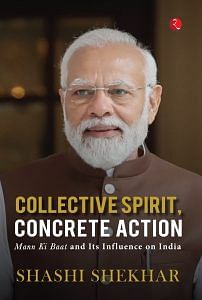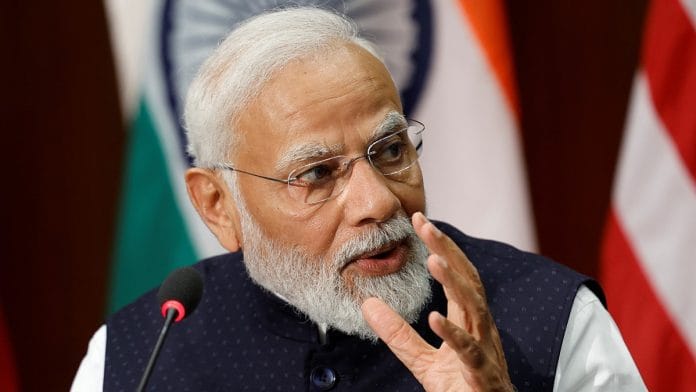Prime Minister Narendra Modi routinely applies ancient history as a compass to navigate modern life’s many challenges seamlessly across subjects— from water conservation to overcoming examination anxieties around mathematics—even as he continues to engage his listeners. Elaborating on how the idea of zero was conceived by ancient Indian mathematicians, he drew upon India’s rich mathematical heritage to boost confidence in young minds to tackle upcoming examinations. The PM’s championing of mathematics through Mann Ki Baat stands in stark contrast with recent developments in the United States (US) where mathematics in school curricula has taken a backseat across several school districts.5 Two Sanskrit quotes drawn from ancient Indian texts helped bring home the point on how ancient India valued math skills.
Underscoring how math bridges the ancient with the modern, PM Modi spoke about a painting gifted to him by the CEO of Intel, in which an Indian method of arithmetic computation and measurement was depicted through Vamana, one of the 10 avatars of Lord Vishnu, in which he appears as a brahmin of dwarfish stature to restore dharma or the natural order on the Earth. From extolling the contributions of Pingala, an ancient Indian poet-mathematician to celebrating modern Indian mathematicians like Srinivasa Ramanujan, PM Modi’s focus on math has been on motivating young minds to overcome their fears and anxieties and celebrating uniquely Indian ways of thinking about math.
The roving eye of PM Modi’s Mann Ki Baat over the past nine years has constantly been on the lookout for ancient icons to kindle scientific curiosity within young Indian minds. December 2019 was one such occasion, where young listeners were not only regaled with tales of ancient astronomers and mathematicians, such as Aryabhatta and Bhaskara, but were also introduced to Madhava of Sangamagrama, who is credited with having developed mathematical techniques of calculus more than a century prior to Isaac Newton. Exhorting the youth towards a culture of star gazing and studying the night sky, Modi shared a lesser-known Gujarati work on the ancient science of navigation.
The night sky was not merely something that whetted the curiosity. It was an important source for mathematicians and scientists. A few years ago, I had unveiled a book called Pre- modern Kutchi Navigation Techniques and Voyages. This book, in a way, is the diary of Maalam. Maalam was a navigator and whatever he experienced professionally, he recorded it in his diary. Even in the modern age, the very same ‘Maalam’s volume’ exists as a collection of ancient Gujarati manuscripts. It describes ancient navigation technology, and that ‘Maalam’s volume’ repeatedly references, the sky, the stars, the speed of the stars, and clearly describes how the direction is determined in sea voyages with the help of stars; it is stars that navigate us towards our destination.
Prime Minister Narendra Modi’s invocation of the ancient to negotiate the modern has gone beyond dispelling myths and fears to breaking stereotypes and clearing misconceptions. Ancient India’s naval history was the focus of the November 2017 episode of Mann Ki Baat. Tracing the heritage of Indian seafaring from the Chola dynasty to Chhatrapati Shivaji, PM Modi spoke at length on the strategic and economic significance of sea and fresh water routes while also highlighting the role of women seafarers who played a crucial role in the Chola Navy.
Ancient wisdom and modern science came together again in February 2018 when the programme focussed on the emerging trends in artificial intelligence (AI) and the immense potential it held for India’s future development. Recalling the words of Sri Aurobindo, Modi emphasized the ancient Indian ethic of interrogating abstract ideas in the pursuit of knowledge.
I am fortunate today to be in Auroville, the land, the karmabhoomi of Maharshi Arvind. As a revolutionary, he challenged British rule, fought against them and questioned subjugation. Thus, as a great sage, he questioned every facet of life. Extracting answers, he showed the right path to humanity. The relentless quest to ask questions for knowing the truth is very important. And this is the very essence[—]the real inspiration behind scientific inventions and discoveries. Never rest till every ‘why’, ‘what’ [and] ‘how’ are answered.
Prime Minister Modi’s melding of the ancient with the modern has consistently focussed on breaking gender stereotypes in India, as reflected in the episode that observed the death anniversary of Kalpana Chawla, the first Indian-origin woman astronaut who lost her life during the Space Shuttle Columbia disaster in February 2003. Ever since her first space flight, Kalpana has been an inspirational figure in India, motivating girls across the country to dream big and aspire to reach the stars. Recalling Kalpana’s life story and the lessons it held for women across India, PM Modi dwelt at length on nari shakti (power of women). Quoting the Skanda Purana, he reminded his listeners how ancient India valued and worshipped the girl child.
Also read: Clean India to New India—Modi’s Mann Ki Baat weren’t just messages. They became movements
From composing Vedic verses to expounding on philosophy, the scholarship of Lopamudra, Gargi and Maitreyi is as significantly inspirational to modern Indian young women as Kalpana Chawla’s achievements. Threading ancient and medieval times alongside modern India, PM Modi’s reference to iconic women and their life stories spans multiple eras and traverses the diversity across India—from Akka Mahadevi to Meerabai, Ahilyabai Holkar to Rani Lakshmibai.
[The] well-known 17th century poetess Sanchi Honnamma has penned a poem in Kannada that embodies the same thought, the same words pertaining to every Lakshmi of India that we referred to. One feels the foundation of the idea was laid in the 17th century itself. You will notice the beauty of word, sentiment and thought in this poem in Kannada:
(Penninda permegondanu himavantanu. Penninda broohu perchidanu
Penninda janakaraayanu jasuvalendanu)
Which means, Himwant, Lord Mount, attained fame on account of daughter Parvati, Rishi Brighu on account of his daughter Lakshmi and King Janak because of daughter Sita. Our daughters are our pride… their prodigious virtuosity cradles our social fabric, ensuring its bright future.
India’s ancient heritage, while being a constant companion all through Mann Ki Baat, neither blinded PM Modi from drawing attention to present-day challenges, nor detracted from modern science when it came to motivating mass-scale behavioural change to deal with the societal challenges confronting India. Covid-19 was perhaps the biggest test of effectiveness of PM Modi’s melding of the past with the present, to chart a course for the future. While consistently advising citizens across India to practice yoga and seek succour from traditional Indian healing techniques, such as Ayurveda, Mann Ki Baat was upfront in taking on vaccine hesitancy. Prime Minister Modi’s simultaneous advocacy of modern medical science alongside ancient methods of healing and well-being ensured India administered well over 200 crore vaccine doses, surpassing entire nations and continents. With the Indian economy fully open even as neighbouring China struggled with lockdowns, Mann Ki Baat demonstrated that seeking inspiration from the ancient to find harmony with the modern was not an abstract idea, but a practical way of life that can deliver large-scale results by inspiring mass behavioural change.
 This excerpt from Shashi Shekhar’s ‘Collective Spirit, Concrete Action’ has been published with permission from Rupa Publications.
This excerpt from Shashi Shekhar’s ‘Collective Spirit, Concrete Action’ has been published with permission from Rupa Publications.






